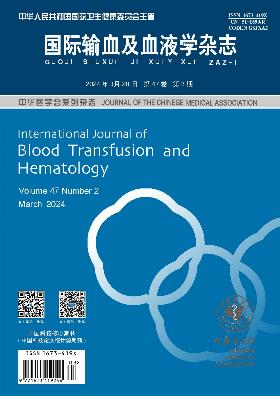Immunophenotypic characteristics and prognosis of adult patients with initial treatment of acute myeloid leukemia
引用次数: 0
Abstract
Objective To investigate the immunophenotypic characteristics of adult patients with initial treatment of acute myeloid leukemia (AML), as well as its relationship with curative effect. Methods A total of 167 adult patients with initial treatment of AML were randomly selected by computer generated random number method from January 2013 to December 2016 in Zibo Central Hospital of Shandong Province. Monoclonal antibody direct immunofluorescence labeling was used to label AML cell antigens of patients. The immunophenotypes of myeloid cell lines, lymphoid cell lines, and hematopoietic stem/progenitor cells of patients′ AML cells were analyzed by tricolor flow cytometry two-parameter scatter plot with CD45/side scatter (SSC). All AML patients were treated with conventional induction chemotherapy. After 1 course of chemotherapy, complete remission (CR) rates of patients were observed. The CR rates of AML patients of different immunophenotype were compared using χ2 test. The study protocol was approved by the Ethical Review Board of Investigation in Human Being of Zibo Central Hospital (Approval No. 2013-9). Informed consent was obtained from each participant. Results ① Among 167 adult patients with initial treatment of AML in this study, myeloid cell lines related antigens of positive expression rates from high to low were as follows: CD33 (90.4%, 151/167), CD13 (87.4%, 146/167), CD117 (79.0%, 132/167), myeloperoxidase (MPO) (71.3%, 119/167), CD64 (31.7%, 53/167), CD14 (21.6%, 36/167) and CD71 (4.2%, 7/167). The positive expression rates of CD14 and CD64 in 33 AML-M4 patients and 40 AML-M5 patients were high. The positive expression rates of CD14 and CD64 in AML-M4 patients were 24.2% (8/33) and 48.5% (16/33), respectively. And the positive expression rates of CD14 and CD64 in AML-M5 patients were 62.5% (25/40) and 77.5% (31/40), respectively. CD71 expressions were all positive in 5 AML-M6 patients. ② The hematopoietic stem/progenitor cells related antigens of positive expression rates from high to low in 167 adult patients with initial treatment of AML were as follows: CD38 (89.8%, 150/167), human leukocyte antigen (HLA)-DR (58.7%, 98/167), and CD34 (57.5%, 96/167). The positive expression rates of CD34 and HLA-DR were low in 34 AML-M3 patients, which were 5.9% (2/34) and 8.8% (3/34), respectively. ③ The lymphoid cell lines related antigens of positive expression rates from high to low in 167 adult patients with initial treatment of AML were as follows: CD7 (20.4%, 34/167), CD19 (13.8%, 23/167), CD4 (7.2%, 12/167), CD2 (4.2%, 7/167), CD10 (1.8%, 3/167), CD22 (1.2%, 2/167) and CD20 (0.6%, 1/167). ④ In all 167 adult patients with initial treatment of AML, 103 patients achieved CR with a CR rate of 61.7% after the first induction chemotherapy. In 133 patients with non-AML-M3 subtype, CR rates of AML patients with CD7 and CD34 positive expression were 51.5% (17/33) and 45.7% (43/94), which were lower than those of negative expression patients with CR rates of 72.0% (72/100) and 69.2% (27/39), and the differences were statistically significant (χ2=4.703, P=0.030; χ2=6.099, P=0.014). The CR rates of AML patients with MPO and CD19 positive expression were 71.3% (62/87) and 69.6% (16/23), which were higher than those of negative expression patients with CR rates of 47.8% (22/46) and 46.4% (51/110), and the differences were statistically significant (χ2=7.104, P=0.008; χ2=4.096 , P=0.043). Conclusions CD33, CD13, CD117 and MPO are common immune markers of adult patients with initial treatment of AML. CR rates after the first induction chemotherapy of adult patients with initial treatment of AML expressing CD7 and CD34 positive, are lower than those of negative ones, and CR rates of patients with positive expression of MPO and CD19 are higher than those of negative ones. Immunophenotype has great significance for the diagnostic classification and prognosis of AML. Key words: Leukemia, myeloid, acute; Immunophenotyping; Drug therapy; Prognosis; Treatment outcome; Flow cytometry; Adult成人急性粒细胞白血病初治患者的免疫表型特征及预后
目的探讨急性髓性白血病(AML)成年患者初始治疗的免疫表型特征及其与疗效的关系。方法采用计算机生成随机数法随机抽取2013年1月至2016年12月山东省淄博市中心医院急性髓系白血病(AML)初诊成人患者167例。采用单克隆抗体直接免疫荧光标记法对患者的AML细胞抗原进行标记。采用三色流式细胞术CD45/侧散点(SSC)双参数散点图分析AML患者骨髓细胞系、淋巴细胞系和造血干细胞/祖细胞的免疫表型。所有AML患者均采用常规诱导化疗。化疗1个疗程后,观察患者完全缓解率。采用χ2检验比较不同免疫表型AML患者的CR率。本研究方案经淄博市中心医院人体研究伦理审查委员会批准(批准号2013-9)。获得每位参与者的知情同意。结果①本研究167例初诊AML成人患者中,髓系相关抗原阳性表达率由高到低依次为:CD33(90.4%, 151/167)、CD13(87.4%, 146/167)、CD117(79.0%, 132/167)、髓过氧化物酶(MPO)(71.3%, 119/167)、CD64(31.7%, 53/167)、CD14(21.6%, 36/167)、CD71(4.2%, 7/167)。33例AML-M4患者和40例AML-M5患者中CD14和CD64的阳性表达率较高。AML-M4患者中CD14和CD64的阳性表达率分别为24.2%(8/33)和48.5%(16/33)。AML-M5患者中CD14和CD64的阳性表达率分别为62.5%(25/40)和77.5%(31/40)。5例AML-M6患者CD71表达均为阳性。②167例成人AML初始治疗患者造血干细胞/祖细胞相关抗原阳性表达率由高到低依次为:CD38(89.8%, 150/167)、人白细胞抗原(HLA)-DR(58.7%, 98/167)、CD34(57.5%, 96/167)。34例AML-M3患者CD34和HLA-DR阳性表达率较低,分别为5.9%(2/34)和8.8%(3/34)。③167例成人AML初始治疗患者淋巴系相关抗原阳性表达率由高到低依次为:CD7(20.4%, 34/167)、CD19(13.8%, 23/167)、CD4(7.2%, 12/167)、CD2(4.2%, 7/167)、CD10(1.8%, 3/167)、CD22(1.2%, 2/167)、CD20(0.6%, 1/167)。④167例初始治疗的成年AML患者中,103例患者在首次诱导化疗后达到CR, CR率为61.7%。133例非AML- m3亚型患者中,CD7、CD34阳性表达AML患者的CR率分别为51.5%(17/33)、45.7%(43/94),低于CD7、CD34阴性表达AML患者的CR率分别为72.0%(72/100)、69.2%(27/39),差异均有统计学意义(χ2=4.703, P=0.030;χ2 = 6.099,P = 0.014)。MPO和CD19阳性表达AML患者的CR率分别为71.3%(62/87)和69.6%(16/23),高于MPO和CD19阴性表达AML患者的CR率分别为47.8%(22/46)和46.4%(51/110),差异有统计学意义(χ2=7.104, P=0.008;χ2=4.096, p =0.043)。结论CD33、CD13、CD117和MPO是成人急性髓系白血病初始治疗患者常见的免疫标志物。初始治疗的成年AML患者,CD7和CD34表达阳性,首次诱导化疗后的CR率低于阴性患者,MPO和CD19表达阳性患者的CR率高于阴性患者。免疫表型对AML的诊断分型及预后有重要意义。关键词:白血病,髓系,急性;Immunophenotyping;药物治疗;预后;治疗效果;流式细胞术;成人
本文章由计算机程序翻译,如有差异,请以英文原文为准。
求助全文
约1分钟内获得全文
求助全文
来源期刊
自引率
0.00%
发文量
10610
期刊介绍:
The International Journal of Transfusion and Hematology was founded in September 1978. It is a comprehensive academic journal in the field of transfusion and hematology, supervised by the National Health Commission and co-sponsored by the Chinese Medical Association, West China Second Hospital of Sichuan University, and the Institute of Transfusion Medicine of the Chinese Academy of Medical Sciences. The journal is a comprehensive academic journal that combines the basic and clinical aspects of transfusion and hematology and is publicly distributed at home and abroad. The International Journal of Transfusion and Hematology mainly reports on the basic and clinical scientific research results and progress in the field of transfusion and hematology, new experiences, new methods, and new technologies in clinical diagnosis and treatment, introduces domestic and foreign research trends, conducts academic exchanges, and promotes the development of basic and clinical research in the field of transfusion and hematology.

 求助内容:
求助内容: 应助结果提醒方式:
应助结果提醒方式:


